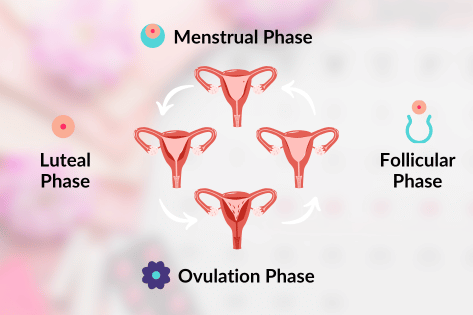The menstrual cycle is a natural process that plays a vital role in reproductive health. While it’s common knowledge that the cycle involves a monthly period, there’s much more happening beneath the surface. By understanding the phases of your menstrual cycle, you can better track changes in your body, identify irregularities, and take proactive steps for your health.
What Is the Menstrual Cycle?
The menstrual cycle is the monthly hormonal process that prepares the body for pregnancy. A typical cycle lasts 28 days, but it can range from 21 to 35 days and still be considered normal. The cycle begins on the first day of your period and ends the day before your next period starts.
The process is regulated by hormones like estrogen and progesterone, which guide the body through four distinct phases:
The Four Phases of the Menstrual Cycle

1. Menstrual Phase (Days 1-5)
- What Happens: This phase begins on the first day of menstruation when the uterine lining (endometrium) sheds. This causes bleeding, commonly referred to as your period.
- Duration: Typically lasts 3-7 days.
- Symptoms: Common symptoms include cramping, fatigue, bloating, and mood changes.
2. Follicular Phase (Days 1-14)
- What Happens: Overlaps with the menstrual phase. During this phase, the pituitary gland releases follicle-stimulating hormone (FSH), prompting the ovaries to develop follicles. One follicle will mature into an egg.
- Duration: Can vary but typically lasts about 14 days in a 28-day cycle.
- Key Role: The uterine lining starts to rebuild to prepare for a possible pregnancy.
3. Ovulation Phase (Day 14)
- What Happens: Midway through the cycle, the ovary releases a mature egg into the fallopian tube. This process is triggered by a surge in luteinizing hormone (LH).
- Duration: Ovulation itself lasts 24 hours, but the fertile window spans several days.
- Signs of Ovulation: Slight increase in basal body temperature, cervical mucus changes (clear and stretchy), and mild pelvic discomfort.
4. Luteal Phase (Days 15-28)
- What Happens: After ovulation, the ruptured follicle forms the corpus luteum, which secretes progesterone to maintain the uterine lining. If fertilization doesn’t occur, the corpus luteum breaks down, and hormone levels drop.
- Duration: Typically 14 days.
- Symptoms: Premenstrual symptoms (PMS) like mood swings, bloating, breast tenderness, and fatigue may occur.
What’s Considered Normal?
The menstrual cycle can vary from person to person, but the following are considered typical:
- Cycle Length: 21 to 35 days.
- Period Length: 2 to 7 days.
- Flow: Light to moderate, with some heavier days.
When to Be Concerned

You should consult a healthcare provider if you experience:
- Irregular cycles that vary widely in length.
- Heavy bleeding requiring frequent pad or tampon changes.
- Missed periods without a clear reason (e.g., pregnancy or menopause).
- Severe pain or cramping that interferes with daily activities.
- Unusual symptoms like spotting between periods.
Tracking Your Cycle

Tracking your menstrual cycle can help you understand what’s normal for your body and identify potential issues. Use tools like a calendar, smartphone app, or symptom diary to monitor:
- Start and end dates of your period.
- Flow intensity and duration.
- Symptoms like cramping or mood changes.
- Signs of ovulation, such as cervical mucus changes.
Supporting Your Menstrual Health
Simple steps to support a healthy cycle include:
- Maintaining a balanced diet with plenty of iron and omega-3 fatty acids.
- Staying hydrated to alleviate bloating and cramping.
- Exercising regularly to improve blood flow and reduce PMS symptoms.
- Managing stress through mindfulness or relaxation techniques.
When to Seek Help
If you’re unsure whether your cycle is normal or if you’re experiencing disruptive symptoms, our team at the Women’s Center of Athens is here to help. Schedule an appointment for a comprehensive evaluation and personalized care. Take control of your menstrual health by booking an appointment with the Women’s Center of Athens. Our board-certified physicians are here to guide you through every phase of your reproductive health journey.


